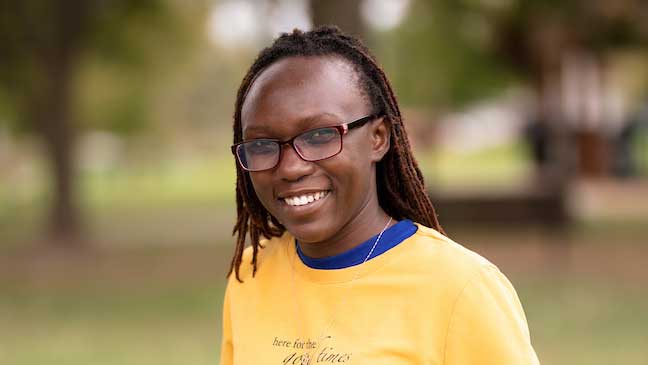On a Mission to Improve Cassava: Meet Ketra Oketcho
Ever since she was a child in Uganda, Ketra Oketcho has been interested in the science behind the natural world. She would let a mosquito bite her to see how long it would take to feel the itch. When she noticed a papaya plant beginning to flower, she took a photo each day before school to monitor its development. Years later, as a volunteer at the National Agriculture Research Organization in Uganda (NARO), she looked into a microscope for the first time and knew she was meant to do research.
When Ketra was hired at NARO, she gained experience doing plant transformation and field research in the VIRCA Plus project. She also met Nigel Taylor, PhD, Associate Member and Dorothy J. King Distinguished Investigator, and Becky Bart, PhD, Associate Member, who encouraged her to continue to develop in her career. Today, she is a graduate student at the University of Missouri-St. Louis, conducting research in Dr. Nigel Taylor’s lab and Dr. Rebecca Bart’s lab at the Donald Danforth Plant Science Center to understand how the cassava mosaic virus replicates in cassava.
The Need for Improved Cassava
Growing up in the village of Rubongi, Ketra experienced first-hand the impact that improved cassava could have on food security and human health. Cassava and millet are staples used to make bread. “People do not consider a meal complete unless that bread is present,” explains Ketra. “If a disease wiped out cassava, the people in my village would simply starve. They would not eat.”
She hopes that improved cassava can get into farmers’ hands soon. “It would really save the day for so many people. We need to have cassava. Not only is it necessary for survival, it is also a part of our identity,” she says.

Ketra Oketcho, University of Missouri-St. Louis graduate student in Dr. Nigel Taylor’s lab and Dr. Rebecca Bart’s lab.
Creating Solutions for Food Insecurity
Ketra’s experiences have made her a better researcher. In Uganda, lab resources are not always easily accessible, so she has learned how to prioritize the most important work. And she can help guide the research to answer questions that would be most important to consumers. In turn, Ketra has also learned from her collaborators at the Danforth Center. “I appreciate being around people who are very passionate about research,” she explains. “I’ve learned that there are many different approaches to research, and many routes to achieving the same goal. It has opened my eyes to how many things can be done to help solve the problem of food security.”
Ketra is hopeful about the impact her work can have in her home country. “Being a part of creating a solution that is going to impact so many peoples’ lives is a big deal. I feel grateful to be a part of the effort to find a solution for food security,” says Ketra.